I’m writing this on a beachfront balcony with a spectacular ocean view. My hotel room is spotless, spacious and well-equipped. Meals are delivered to the door thrice daily, and my all-inclusive two-week stay is free. True, the beach remains tantalizingly inaccessible. But that’s the only downside of Taiwan’s quarantine system from where I sit.
In March 2020, the BBC caused a kerfuffle by quoting the mother of a British tourist who had bemoaned the “prison-like” and “filthy” conditions of a quarantine facility in Hualien. After a strenuous rebuttal from the Ministry of Foreign Affairs (MOFA) and the Central Epidemic Command Center (CECC), which included typically hyperbolic flourishes about “the damage done to the nation’s reputation,” the BBC promptly removed the report from its Web site.
Admittedly, non-home quarantine seems to have been a mixed bag since its introduction for non-residents early last year.
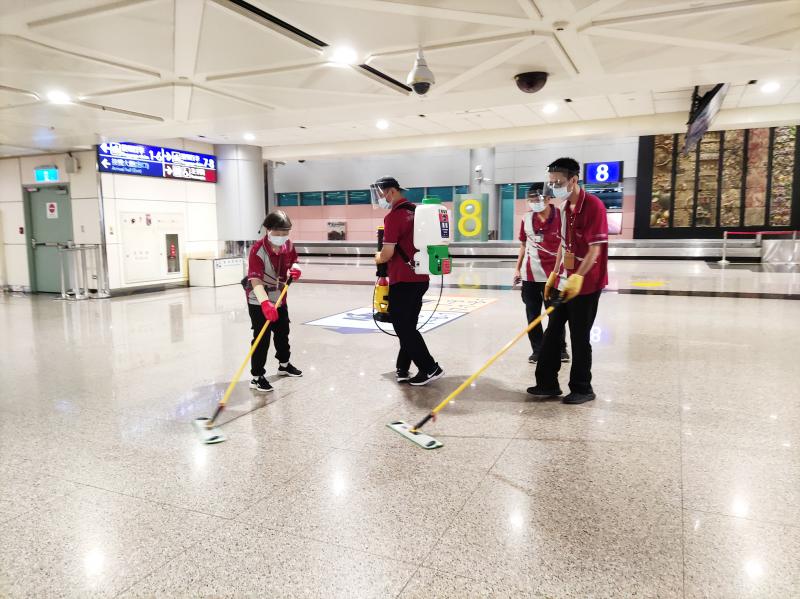
Photo: James Baron
The facility in Hualien was a converted school and looked spartan. The woman’s complaints about a lack of hot water were legit — MOFA admitting the shower in her room was broken — though quickly resolved, according to officials, as were requests for gluten-free meals.
There was, however, no response from MOFA or Minister of Health and Welfare and CECC head Chen Shih-chung (陳時中) to claims about an absence of laundry facilities. My experience suggests this was another reasonable gripe.
Further devil’s advocacy: The Brit got hit with this during a stopover en route to Australia and, while she should have been prepared, this was early on, when there was even more confusion than there is now.
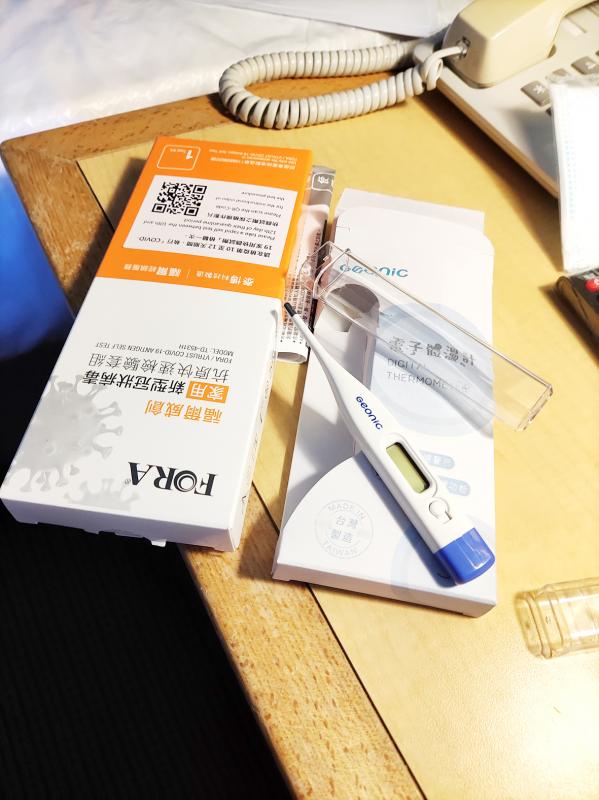
Photo: James Baron
Still, the couple were told they could stay in their original guesthouse for the duration but pled poverty. So, they got the dorm facility for NT$267 a night. This essentially covered the food, which was lambasted for its “poor quality and meager proportions.” What did they expect for seven quid?
More recently, a self-paid quarantine hotel in Miaoli County was fined by the county government for sanitation and services that were deemed so poor that Consumers’ Foundation Chairman Terry Huang (黃怡騰) said they would “bring shame to Taiwan.”
Perhaps I got lucky — though, as the saying goes, you make your own luck.
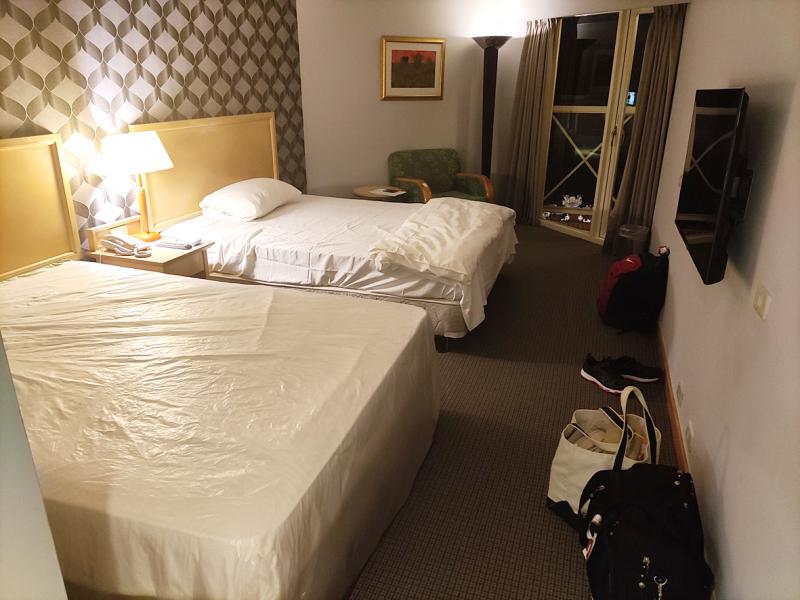
Photo: James Baron
CHANGE OF RULES
After months of back-and-forths with representative offices in seven countries, I decided upon a route to Mallorca, where my family have a home. I’d received my second AstraZeneca jab on July 1 and was to fly two weeks later — the minimum advised period after the second shot.
I still wasn’t sure whether we would be allowed into Spain, as the Spanish Chamber of Commerce in Taipei couldn’t or wouldn’t give me a straight answer and eventually stopped answering my e-mails and calls. There were several contingencies: flying from Taiwan, entering as British nationals and — crucially — the transit point.
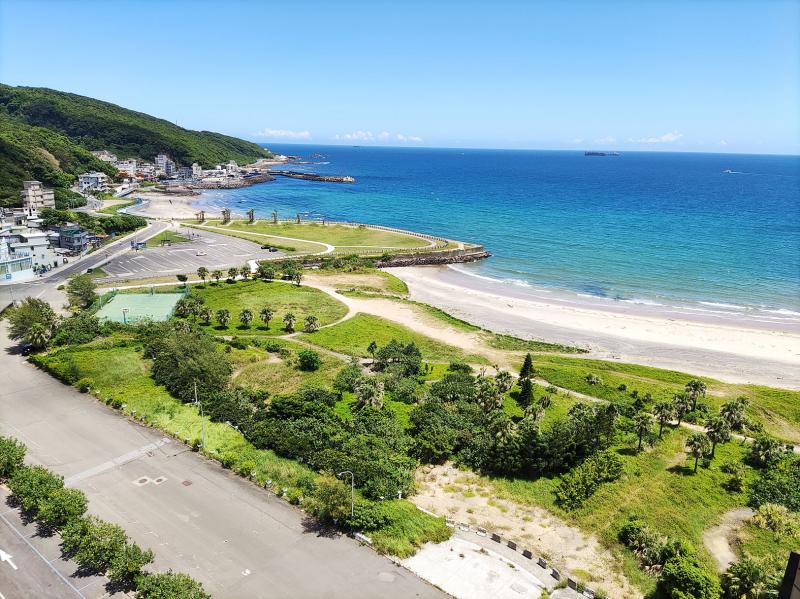
Photo: James Baron
Days before the second jab, an end to home quarantine for residents was announced. Returning with my younger son would cost at least NT$56,000 for a 14-day hotel stay. But there was a loophole: Anyone coming from one of seven countries deemed high-risk because of the Delta variant would stay for free in a government facility.
Responding to claims that the new policy encouraged rerouting via the danger zones, Chen insisted this was neither “necessary” nor “cost-effective.” This was obvious nonsense. One swift phone call to the Taiwan Centers for Disease Control (CDC) hotline to confirm that transit would suffice, and I immediately rerouted my return through London.
FAMILIAR SCENE
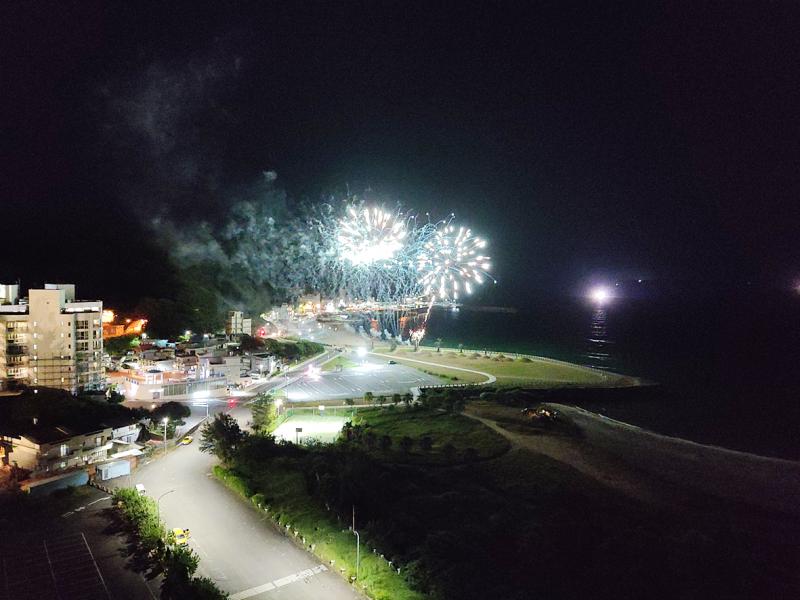
Photo: James Baron
I’d already heard horror stories about the free government facilities. Certain that conditions couldn’t be worse than many places I’ve stayed, I wasn’t bothered. Having slummed it in Burma, Mongolia and Russia — in tents, dorms and yurts — my son is also no fusspot.
At the very least, I knew what Taiwan offered would be relatively clean, with free meals and Wi-Fi, so I could work for the duration. It would also be a familiar language and culture.
What we got was well beyond expectation.
It is past 9pm when the designated airport bus rounds the bay at Dawulun (大武崙). There are seven of us — five flying from the UK and two from India. Although CDC staff didn’t reveal our destination, this stretch of coast is distinctive. Even in the dusk, my son and I recognized it as the spot where we’d been overtaken by some more serious cyclists while climbing in the opposite direction a year earlier.
A few kilometers on, just past Wanli UFO Village and its remarkable Futuro and Venturo houses, we pull into a carpark and stop alongside another familiar landmark — the abandoned faux-castle wing of the Howard Green Bay Resort.
PERSISTENCE PAYS OFF
Outside the back of the hotel proper, as the luggage is unloaded, a man in a convenience-store rain poncho, mask and goggles beckons us with a flashing traffic baton toward an illuminated doorway. We line up at socially distanced intervals, waiting to be checked in by a pair of CDC employees clad in hazmat suits.
The first and only real problem is their insistence that my son cannot stay with me. Online CDC regulations mention under-12s staying for free with parents in self-paid hotels. But I see nothing corroborating the claim that children over 12 must quarantine separately. One day of whingeing via the contact channel each inmate sets up on the Line app, and they relent.
I phone my son next door to convey the good news. “Now?” he asks, the disappointment obvious. “I thought I could have another couple of days.”
Most of our correspondence goes through Line. Almost every request is initially turned down, but I’ve been in Taiwan long enough to know that persistence works wonders.
RULES AND REGULATIONS
The only things that are flat-out denied me are a rack on which to hang the clothes that we have washed in the bath with the powder they provide, and a charger cable for my phone. This is annoying because, contrary to expectations and despite assurances that a router has been placed near our room, the Wi-Fi is almost useless.
To pass the time, we do push-ups, read and watch eagles scouring the waves that surfers try to catch. One evening, there’s a fireworks display to mark the end of Ghost Month; two days later, a rainbow penetrates the cloudy sky. Most nights, the rows of lightbulbs dangling from fishing boat rigging turn the rippled sea into the shimmering rungs of a ladder, stretching across the bay toward a blinking lighthouse.
Some of the rules are stupid and have an authoritarian tone: #7: two short windows for care package deliveries, with all contents to be itemized and anything unlisted to be withheld to “avoid disputes,” followed by the contradictory #8, warning not to “leak” the facility location on pain of prosecution.
On the morning of our release, we walk along the beach. Having enjoyed mask-less outdoor strolls in Europe a couple of weeks earlier, it grates to see police monitoring beaches to ensure isolated individuals are covered up. A week before we left Taiwan, we were stopped by police in the foothills of Yangmingshan — not a soul in sight — and aggressively harangued for having our masks down so we could take a breather after a challenging ride.
Of course, all bets are off in this COVID era as governments strive to strike a balance, but — based on my two weeks in quarantine — Taiwan continues to excel. What the authorities will do when things open up is another question.

Dissident artist Ai Weiwei’s (艾未未) famous return to the People’s Republic of China (PRC) has been overshadowed by the astonishing news of the latest arrests of senior military figures for “corruption,” but it is an interesting piece of news in its own right, though more for what Ai does not understand than for what he does. Ai simply lacks the reflective understanding that the loneliness and isolation he imagines are “European” are simply the joys of life as an expat. That goes both ways: “I love Taiwan!” say many still wet-behind-the-ears expats here, not realizing what they love is being an

Google unveiled an artificial intelligence tool Wednesday that its scientists said would help unravel the mysteries of the human genome — and could one day lead to new treatments for diseases. The deep learning model AlphaGenome was hailed by outside researchers as a “breakthrough” that would let scientists study and even simulate the roots of difficult-to-treat genetic diseases. While the first complete map of the human genome in 2003 “gave us the book of life, reading it remained a challenge,” Pushmeet Kohli, vice president of research at Google DeepMind, told journalists. “We have the text,” he said, which is a sequence of

Every now and then, even hardcore hikers like to sleep in, leave the heavy gear at home and just enjoy a relaxed half-day stroll in the mountains: no cold, no steep uphills, no pressure to walk a certain distance in a day. In the winter, the mild climate and lower elevations of the forests in Taiwan’s far south offer a number of easy escapes like this. A prime example is the river above Mudan Reservoir (牡丹水庫): with shallow water, gentle current, abundant wildlife and a complete lack of tourists, this walk is accessible to nearly everyone but still feels quite remote.

It’s a bold filmmaking choice to have a countdown clock on the screen for most of your movie. In the best-case scenario for a movie like Mercy, in which a Los Angeles detective has to prove his innocence to an artificial intelligence judge within said time limit, it heightens the tension. Who hasn’t gotten sweaty palms in, say, a Mission: Impossible movie when the bomb is ticking down and Tom Cruise still hasn’t cleared the building? Why not just extend it for the duration? Perhaps in a better movie it might have worked. Sadly in Mercy, it’s an ever-present reminder of just